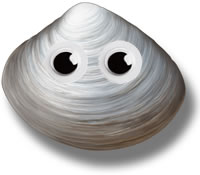
If you’re really happy, you might say that you’re as happy as a clam, as happy as a sandman or as happy as larry.
The expression as happy as a clam is thought to be a shorter version of the phrase “as happy as a clam at high water”, which first appeared in print in 1844 in The Adams Sentinel, a newspaper in Pennsylvania. By 1848 is was fairly well known, especially along the coast of New England, where clams are common.
Why is a clam happy at high water? Possibly because high water, or high tide, is when they are safe from predators.
The sandboy in as happy as a sandboy refers to the men who delivered sand in the 18th and 19th centuries in the UK. The phrase first appeared in print in 1821 in Pierce Egan’s Real Life in London.
The expression as happy as larry first appeard in print in 1875 in the work of G L Meredith, a writer from New Zealand. Nobody know who Larry was or why he was so happy. One theory is that Larry was Larry Foley (1847-1917), an Australian boxer who never lost a fight. Another is that it come from the slang term larrikin, a word of Cornish origin that refers to a hooligan who likes to lark about.
Other versions of this expression include:
– as happy as a dog with two tails
– as happy as a lark
– as happy as the day is long
– as happy as a pig in muck
Do you know any others?
Equivalent expressions in Scottish Gaelic include:
– cho sona ri bròig = as happy as a shoe
– cho sona ri caimeanach an t-sruth = as happy as the giant of the stream
– cho sona ri cuthag ann an nead a coimhearsnaich = as happy as a cuckoo in its neighbour’s nest
– cho sona ri luch ann an lofa = as happy as a mouse in a loaf
– cho sona ri bó ann an loch = as happy as a cow in the loch (lake)
– cho sona ri óthaisg = as happy as a ewe
– cho sona ris an rìgh = as happy as the king
– cho sona ri cat a’ gabhail na gréine = as happy as a cat taking the sun
Are there similar expressions in other languages?
Sources: The Phrase Finder, Mo bhloga, SMO Gàidhlig / Gaeilge Corpus
Russian has “доволен, как слон” — “contented/satisfied as an elephant”, not sure why.
According to an article that I’ve found (http://russkayarech.ru/files/issues/2011/2/21-voznesenskaja.pdf), Russian “доволен, как слон” (satisfied as an elephant) has parallel expressions with other qualities: “веселый, как слон” (happy as…), “грустный, как слон” (unhappy as…), “добрый, как слон” (kind as…), “умный, как слон” (wise as…) and so on. It seems that almost any quality can be combined with “as an elephant” to indicate its large size.